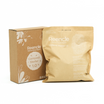Zero Waste Lifestyle
Contributions Through Composting

Did you know that in the United States alone, over 28% of the waste sent to landfills could have been composted instead? That's right, millions of tons of food scraps, yard trimmings, and other organic materials are slowly decomposing in an oxygen-deprived environment, releasing harmful methane gas and contributing to climate change. This alarming statistic highlights the urgent need for sustainable waste management solutions, and one powerful tool readily available to us is composting.
Composting isn't just a trendy buzzword; it's a practical and impactful way for individuals and communities to reduce their environmental footprint and move towards a zero-waste lifestyle. By harnessing the natural decomposition process, composting transforms organic waste into nutrient-rich soil, enriching our gardens, nourishing our landscapes, and diverting waste from landfills.
In this blog, we delve into the world of composting and explore how it plays a pivotal role in fostering sustainable living practices. From understanding the basics of composting to exploring different methods and addressing common challenges, we uncover the myriad benefits of embracing composting as a cornerstone of eco-conscious living.Join us on a journey to discover the transformative power of composting and learn how you can make meaningful contributions to the environment while enriching your own life in the process.
Understanding Composting and its Role in Zero Waste
Composting is the natural process of decomposing organic matter by microorganisms like bacteria and fungi. These tiny organisms break down food scraps, yard trimmings, and other organic materials into nutrient-rich soil amendments called compost. This valuable resource offers numerous benefits for both individuals and the environment.
One of the primary reasons composting aligns perfectly with zero-waste principles is its ability to divert organic waste from landfills. When organic matter decomposes in landfills, it generates methane, a potent greenhouse gas contributing to climate change. Composting, on the other hand, promotes aerobic decomposition, releasing significantly less methane and creating a valuable soil amendment.
Beyond reducing landfill methane emissions, compost offers a wealth of benefits for healthy soil and plant growth. It acts as a natural fertilizer, enriching the soil with essential nutrients like nitrogen, phosphorus, and potassium. This translates to healthier plants, improved soil structure, and increased water retention capacity. Composting promotes sustainable agricultural practices by reducing reliance on chemical fertilizers and minimizes environmental pollution associated with their production and use.
Practical Steps to Implement Composting in Your Zero-Waste Journey
Embracing composting in your zero-waste journey is easier than you might think. Here are some practical steps to get started:
The Broader Impact of Composting Beyond Individual Efforts
The significance of composting extends far beyond individual efforts. Large-scale composting initiatives implemented by organizations, municipalities, and even industries can significantly reduce organic waste generation and its associated environmental impacts.
Government policies and regulations play a crucial role in promoting composting infrastructure and public awareness. Encouraging the development of composting facilities, providing subsidies for home composting bins, and implementing mandatory composting regulations for certain sectors can significantly contribute to achieving zero-waste goals.
Community involvement and collaboration are essential for achieving widespread adoption of composting practices. Educational workshops, community composting gardens, and awareness campaigns can empower individuals and foster a collective responsibility towards sustainable waste management.
The economic benefits of composting are another noteworthy aspect. Composting creates job opportunities in waste management and related sectors. Additionally, the use of compost as a natural fertilizer reduces reliance on chemical fertilizers, potentially leading to cost savings for agricultural businesses and individuals.
Conclusion
The power to combat climate change lies not just in large-scale solutions but also in individual actions. By embracing composting at home, individuals can directly contribute to reducing methane emissions and create a positive environmental impact.
Starting a compost bin or pile is surprisingly simple.
Choosing suitable materials like food scraps, yard trimmings, and cardboard is crucial. Maintaining proper moisture and aeration levels ensures efficient decomposition. Numerous resources and online tutorials provide detailed guidance on setting up and maintaining a successful compost system.
Community composting programs offer another avenue for individuals to participate in reducing methane emissions. These programs often provide convenient drop-off locations for residents to contribute their organic waste, which is then collectively composted in larger facilities. Participating in such programs not only reduces individual waste but also fosters a sense of community and collective action towards environmental sustainability.
Beyond composting, individuals can further contribute by minimizing food waste and practicing responsible consumption habits. Planning meals, buying only what's needed, and utilizing leftovers are simple yet impactful ways to reduce the amount of organic waste generated in the first place
The Broader Impact of Composting
The benefits of composting extend far beyond methane reduction. Composted material, rich in nutrients and organic matter, acts as a valuable soil amendment. It improves soil structure, aeration, and water retention, leading to healthier and more productive plants.
This reduces reliance on chemical fertilizers, further contributing to sustainable agricultural practices.
Composting also holds economic potential. As the demand for compost grows, it creates opportunities for new jobs in the waste management sector. Additionally, reducing reliance on landfills translates to cost savings for municipalities and individuals.
Conclusion
Composting may seem like a small, individual action, but its collective impact on mitigating climate change is significant. By diverting organic waste from landfills and promoting aerobic decomposition, composting significantly reduces potent methane emissions, contributing to a healthier planet for ourselves and future generations.
Embracing composting is not just about environmental responsibility; it's about embracing a sustainable lifestyle and fostering a sense of community around a shared goal. Every individual who starts composting participates in community programs, or simply reduces food waste, is taking a step towards a more sustainable future.
Remember, even small changes, when multiplied by millions, can create a powerful ripple effect.
Let's harness the power of composting and collectively work towards a future where our everyday actions leave a positive mark on the environment.














